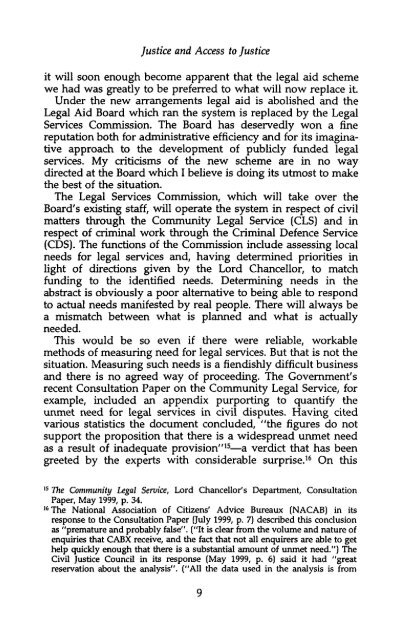HAMLYN - College of Social Sciences and International Studies ...
HAMLYN - College of Social Sciences and International Studies ...
HAMLYN - College of Social Sciences and International Studies ...
You also want an ePaper? Increase the reach of your titles
YUMPU automatically turns print PDFs into web optimized ePapers that Google loves.
Justice <strong>and</strong> Access to Justice<br />
it will soon enough become apparent that the legal aid scheme<br />
we had was greatly to be preferred to what will now replace it.<br />
Under the new arrangements legal aid is abolished <strong>and</strong> the<br />
Legal Aid Board which ran the system is replaced by the Legal<br />
Services Commission. The Board has deservedly won a fine<br />
reputation both for administrative efficiency <strong>and</strong> for its imaginative<br />
approach to the development <strong>of</strong> publicly funded legal<br />
services. My criticisms <strong>of</strong> the new scheme are in no way<br />
directed at the Board which I believe is doing its utmost to make<br />
the best <strong>of</strong> the situation.<br />
The Legal Services Commission, which will take over the<br />
Board's existing staff, will operate the system in respect <strong>of</strong> civil<br />
matters through the Community Legal Service (CLS) <strong>and</strong> in<br />
respect <strong>of</strong> criminal work through the Criminal Defence Service<br />
(CDS). The functions <strong>of</strong> the Commission include assessing local<br />
needs for legal services <strong>and</strong>, having determined priorities in<br />
light <strong>of</strong> directions given by the Lord Chancellor, to match<br />
funding to the identified needs. Determining needs in the<br />
abstract is obviously a poor alternative to being able to respond<br />
to actual needs manifested by real people. There will always be<br />
a mismatch between what is planned <strong>and</strong> what is actually<br />
needed.<br />
This would be so even if there were reliable, workable<br />
methods <strong>of</strong> measuring need for legal services. But that is not the<br />
situation. Measuring such needs is a fiendishly difficult business<br />
<strong>and</strong> there is no agreed way <strong>of</strong> proceeding. The Government's<br />
recent Consultation Paper on the Community Legal Service, for<br />
example, included an appendix purporting to quantify the<br />
unmet need for legal services in civil disputes. Having cited<br />
various statistics the document concluded, "the figures do not<br />
support the proposition that there is a widespread unmet need<br />
as a result <strong>of</strong> inadequate provision" 15 —a verdict that has been<br />
greeted by the experts with considerable surprise. 16 On this<br />
15 The Community Legal Service, Lord Chancellor's Department, Consultation<br />
Paper, May 1999, p. 34.<br />
16 The National Association <strong>of</strong> Citizens' Advice Bureaux (NACAB) in its<br />
response to the Consultation Paper (July 1999, p. 7) described this conclusion<br />
as "premature <strong>and</strong> probably false". ("It is clear from the volume <strong>and</strong> nature <strong>of</strong><br />
enquiries that CABX receive, <strong>and</strong> the fact that not all enquirers are able to get<br />
help quickly enough that there is a substantial amount <strong>of</strong> unmet need.") The<br />
Civil Justice Council in its response (May 1999, p. 6) said it had "great<br />
reservation about the analysis". ("All the data used in the analysis is from

















